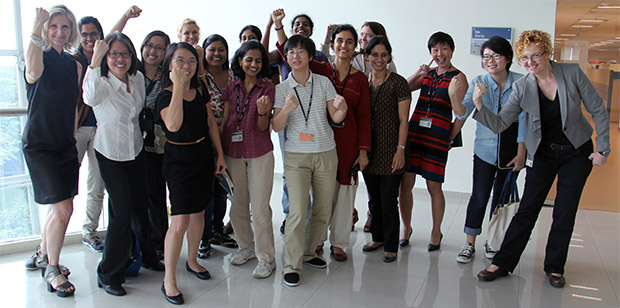-
Advocacy Theme
-
Tags
- Abortion
- Adoption
- Caregiving
- CEDAW
- Disability
- Domestic Violence
- Domestic Workers
- Harassment
- Healthcare
- Housing
- International/Regional Work
- Maintenance
- Media
- Migrant Spouses
- Migrant Workers
- Muslim Law
- National budget
- Parental Leave
- Parenthood
- Polygamy
- Population
- Race and religion
- Sexual Violence
- Sexuality Education
- Single Parents
- Social Support
- Sterilisation
- Women's Charter
Women in Science
January 20th, 2014 | News, Women in Leadership
 On 9 January 2014, AWARE was kindly invited to deliver a lunchtime talk to about twenty people at the newly formed Mechanobiology Institute-Women in Science (MBI-WIS) at the National University of Singapore. Titled “Gender equality in Singapore: an introduction”, and touching on both state policy and societal practice, our presentation gave an overview of some of the gendered barriers in Singapore to the equal social, economic and political participation of all.
On 9 January 2014, AWARE was kindly invited to deliver a lunchtime talk to about twenty people at the newly formed Mechanobiology Institute-Women in Science (MBI-WIS) at the National University of Singapore. Titled “Gender equality in Singapore: an introduction”, and touching on both state policy and societal practice, our presentation gave an overview of some of the gendered barriers in Singapore to the equal social, economic and political participation of all.
In their own words, MBI-WIS is
composed of graduate students, staff, post-doctoral fellows and faculty in the sciences in Singapore. We are dedicated to achieving equity and full participation of women in all areas of science. Our goal is to advance women in science and to discuss and make the research community aware of past, present and future challenges. We seek to increase the participation of women in science at all levels, and to enable the advancement and success of women scientists.
This is an exciting new group and we hope to hear much more from them.
AWARE has performed a few back-of-the-envelope calculations, based on the publicly available profiles of staff in the various university STEM (science, technology, engineering and mathematics) departments in Singapore. Our investigations suggest that despite gender parity in terms of overall undergraduate enrolment numbers (see for instance figures at the Nanyang Technological University), women remain severely underrepresented at the level of STEM faculty.
This is part of a wider global trend, reflecting a simple statement made by Nature, one of the world’s most prestigious scientific journals: “Science remains institutionally sexist.” Fortunately, research shows that straightforward efforts to be more inclusive in terms of organisational decision-making can have a tremendous positive impact on the scientific careers of women. As Singapore moves toward seeking equality in the corporate boardroom, we hope that our centres of learning will follow suit.




